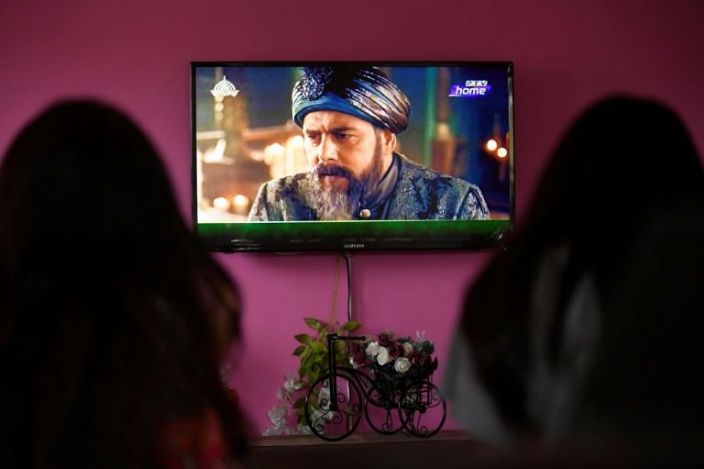Turkey may not have many high-tech exports or brand names that would be familiar to households in the Developed World, but it has developed a first class TV show production industry, with 2019 exports of over $100 mn. It’s latest product Ertugrul: Resurrection is a five-season hit abroad, which tells the story of founding of the Ottoman Empire. Interestingly, the TV series never caught fire at home, being kept in production on state-owned TRT because it promotes Islamic and nationalist values, so highly appreciated by President Erdogan. Yet, soaps, historic dramas and folkloric tales from the Anatolian hinterland are also popular in Moslem world.
Indonesians hooking to Turkish movies, dramas to kill boredom
As the COVID-19 pandemic has forced people to remain indoors, Turkish movies and dramas are entertaining families in Indonesia.
A busy working woman in normal days, Rini Septa, 29, has taken to watch Turkish movies and TV soaps to kill her boredom.
“I like the Turkish films. Many educational and religious values can be learned from them,” she has told Anadolu Agency.
Hooked to online platforms during her spare time, Septa’s favorites have been Fetih 1453 movie and TV series Sultan Abdul Hamid II. The movie Fetih is about Sultan Mehmed, who conquered Constantinople currently Istanbul in 1453.
“It will be better to spend the time during Ramadan to learn useful values from Turkish films. I get information about the films from the Friends of Erdogan, an Indonesian community, which promotes and suggests movies during the restriction,” she said.
Septa said by watching Turkish films, she learns moral values and the glorious civilization of the Ottoman Empire.
For another movie fan, Muhammad Habil, 18, watching Turkish films becomes a part of his daily activities during the lockdown.
“Especially when my area has now been designated as a Red Zone. I cannot go anywhere, so I enjoy watching Turkish films sitting at my home,” Habil, a graphic designer told Anadolu Agency.
He said the Turkish films are rich in history and their depiction of the glorious Ottoman civilization entices all.
Neither Fetih nor the story of deposed Ottoman Emperor Abdul Hamid II grabbed audiences in Turkey, since the latter is associated with a long reign of despotism by Turkish secularists.
Resurrection: Ertugrul has proved a smash hit in Pakistan
Dubbed the Muslim “Game of Thrones”, a drama about the makings of the Ottoman Empire has sent Pakistan wild this Ramadan, smashing television records but exposing the country’s lack of original content.
The Turkish-made series has earned praise for its focus on historical figures from the Muslim world who have been framed as role models for Pakistani youths, and the Urdu-language version of the show has racked up more than 240 million views on YouTube alone.
Lebanese escape from economic crisis, pandemic stress with Turkish TV series
Al-Jadeed, the most-watched television channel in Lebanon, aired three Turkish series with the start of the month of Ramadan. The channel airs one episode before and after the main news bulletin hours. The Turkish series currently entertaining the Lebanese audience are “Sen Anlat Karadeniz” (“Lifeline”), “Fazilet Hanım ve Kızları” (“Mrs. Fazilet and Her Daughters”) and “Siyah Beyaz Aşk” (“Black and White Love”).
MTV, one of the leading television channels in the country, has brought the Turkish series “Bir Zamanlar Çukurova” (“Once Upon a Time in Çukurova”), “Bizim Hikaye” (“Our Story”) and “Kadın” (“The Woman”) to the Lebanese audience.
LBCI, one of the satellite channels operating in Lebanon, continues to broadcast the series “Paramparça” (“Broken Pieces”).
Lebanese journalist Ragib Hallavi said that Turkish series stand out among the Ramadan series because they are some of the best drama productions.
Pointing out that Turkish series consist of humanitarian, social and political messages and therefore attract the Lebanese audience, Hallavi said: “Turkish series have shown that they could compete strongly with Lebanese and other Arabic series. In fact, Turkish series have replaced Lebanese-produced series that had to withdraw from screens due to the COVID-19 outbreak.”
Hallavi noted that the series sector in Turkey is constantly developing, continuing: “The Turkish series are able to get ahead of others due to their constant development, as well as the fact that they do not fall into repetition in script despite their successful cast and giant presentations.”
You can follow our English language YouTube videos @ REAL TURKEY: https://www.youtube.com/channel/UCKpFJB4GFiNkhmpVZQ_d9Rg
And content at Twitter: @AtillaEng
Facebook: Real Turkey Channel: https://www.facebook.com/realturkeychannel/
